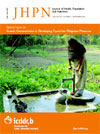
|
The Journal of Health, Population and Nutrition
icddr,b
ISSN: 1606-0997
EISSN: 1606-0997
Vol. 35, No. 1, 2016, pp. 1-10
|
 Bioline Code: hn16025
Bioline Code: hn16025
Full paper language: English
Document type: Research Article
Document available free of charge
|
|
|
The Journal of Health, Population and Nutrition, Vol. 35, No. 1, 2016, pp. 1-10
| en |
Community-based behavior change promoting child health care: a response to socio-economic disparity
Horii, Naoko; Habi, Oumarou; Dangana, Alio; Maina, Abdou; Alzouma, Souleymane & Charbit, Yves
Abstract
Background: Early initiation of breastfeeding after birth is a key behavioral health factor known to decrease
neonatal mortality risks. Yet, few demographic studies examined how a community-based intervention impacts
postpartum breastfeeding among the socio-economically deprived population in Sub-Saharan Africa. A postintervention
evaluation was conducted in 2011 to measure the effect of a UNICEF-led behavior change
communication program promoting child health care in rural Niger.
Methods: A quantitative survey is based on a post hoc constitution of two groups of a study sample, exposed and
unexposed households. The sample includes women aged 15–49 years, having at least one child less than 24 months
born with vaginal delivery. Rate ratio for bivariate analysis and multivariate logistic regression were applied for statistical
analysis. The outcome variable is the initiation of breastfeeding within the first hour of birth. Independent variables
include other behavioral outcome variables, different types of communication actions, and socio-demographic and
economic status of mothers.
Results: The gaps in socio-economic vulnerability between the exposed and unexposed groups imply that mothers
deprived from accessing basic health services and hygiene facilities are likely to be excluded from the communication
actions. Mothers who practiced hand washing and used a traditional latrine showed 2.0 times more likely to initiate
early breastfeeding compared to those who did not (95 % CI 1.4–2.7; 1.3–3.1). Home visits by community volunteers was
not significant (AOR 1.2; 95 % CI 0.9–1.5). Mothers who got actively involved in exclusive breastfeeding promotion as
peers were more likely to initiate breastfeeding within the first hour of birth (AOR 2.0; 95 % CI 1.4–2.9).
Conclusions: A multi-sectorial approach combining hygiene practices and optimal breastfeeding promotion led to
supporting early initiation of breastfeeding. A peer promotion of child health care suggests a model of behavior
change communication strategy as a response to socio-economic disparity.
Keywords
Breastfeeding; Behavior change; Neonatal care; Vulnerability
|
| |
© Copyright 2016 - The Journal of Health, Population and Nutrition
Alternative site location: http://www.jhpn.net
|
|
